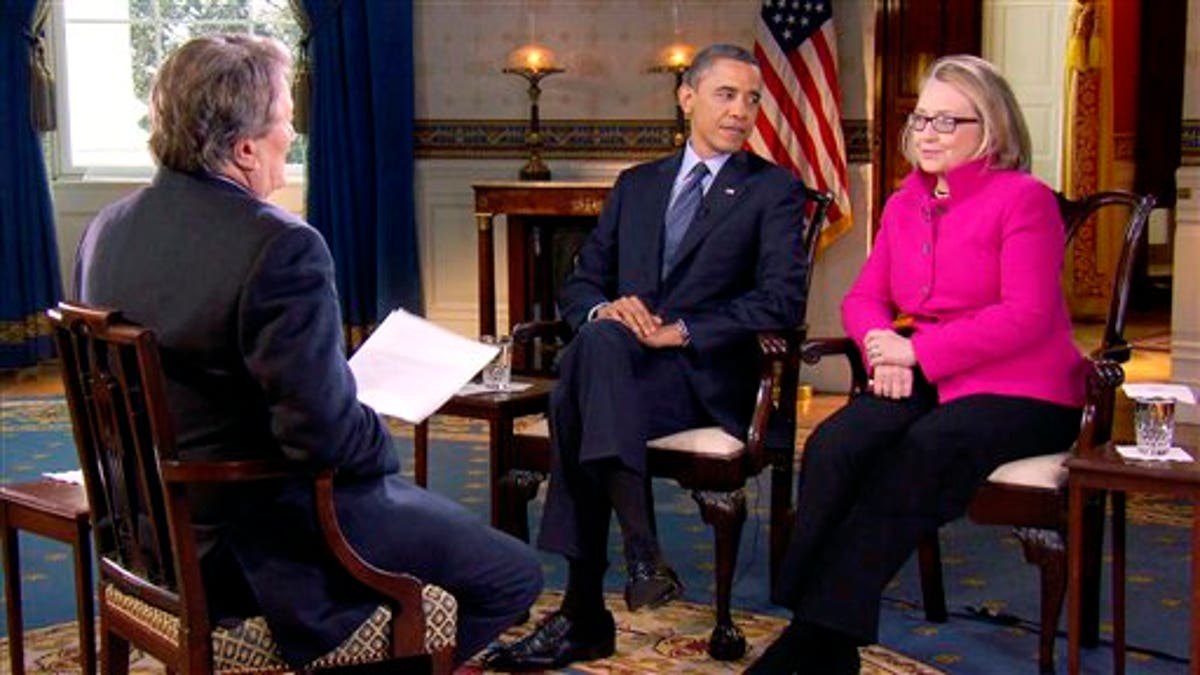
In this Jan. 25, 2013 image taken from video and provided by CBS, President Barack Obama, center, and Secretary of State Hillary Rodham Clinton speak with ”60 Minutes” correspondent Steve Kroft, left, in the Blue Room of the White House in Washington. (AP Photo/CBS)
Last January, President Obama did something that every civics class teaches presidents are not allowed to do under our Constitution. Although the Senate was not in recess, he unilaterally “recess-appointed” four officials to executive posts, three of them to the National Labor Relations Board. The move allowed Obama to avoid the constitutionally mandated Senate confirmation process for all four – temporarily, at least.
This wrong was righted on Friday, when a three-judge panel on the D.C. federal appeals court unanimously struck down the three NLRB appointments on constitutional grounds.
The ruling comes as a surprise only to the journalists and editorial writers who framed this story so wrongly in the first place. Instead of recognizing these appointments for what they were – an obvious abuse of power to deliver an easy election-year favor for organized labor– America’s most important newspaper editorial boards praised Obama for his boldness.
[pullquote]
When the illegal recess appointments were first reported, the Washington Post editorial board called it “Obama’s justifiable ‘power grab,’” and dismissed concerns about them with a blithe, “But so what?”
For The Los Angeles Times, this clear violation of the constitutional balance of power was “a rational response to an increasingly gridlocked Congress.”
Both papers followed Obama’s line in offering Republican obstructionism as a legitimate excuse for violating the Constitution. But neither mentioned that the three NLRB appointments had only been delivered to the Senate right before Christmas, a few business days before Obama installed them.
It is simply impossible to imagine them not condemning let alone praising a Republican president for doing such a thing to overcome a hostile Senate – and in fact, New York Times editorial page editor Andrew Rosenthal admitted as much. “We supported the Democrats under Mr. Bush when they held pro-forma sessions [of the Senate] to block his recess appointments because we believed his choices were egregiously bad,” Rosenthal wrote. “I know this looks hypocritical, but I can’t bring myself to support the Republicans for doing the same...” He was right about the fact that it looks hypocritical.
The flat-footed response of the Washington commentariat to this ruling is a manifestation of what I describe in "Spin Masters" – a liberal bubble-world that the Washington media inhabit, from whose confines even a huge story like this one becomes difficult to recognize.
Similar wishful thinking had led to widespread dismissal of the formidable and substantive legal challenge against ObamaCare’s individual mandate. This suddenly gave way to panic when it became clear the health care law was hanging by a thread.
For the overwhelmingly Obama-sympathetic Washington press corps, stories about presidential abuses of power became far less interesting the moment Obama took the oath of office in 2009.
Thus, the same media that showed such intense interest in the “signing statements” and secretive energy task force of George W. Bush has practically nothing to say about even more important stories that developed in Obama’s first term.
When each of the three broadcast network news programs were given a chance to interview Obama immediately after he declared war in Libya, not one asked about his failure to pursue or obtain permission from Congress.
To this day, no one has asked him directly about his administration’s 2011 drone killing of a 16-year-old Colorado-born U.S. citizen in Yemen.
Such stories as these, and the obvious illegality of the recess appointments, were suppressed during the 2012 campaign in favor of more important things like the War on Women and Mitt Romney’s high school antics.
Despite the media’s deferential attitude, Obama had no serious defense for his appointments. His White House Counsel was reduced to asserting that presidents get to decide when the Senate is in recess and when it isn’t. “This will not do,” wrote D.C. Circuit Chief Judge David Sentelle in response. “Allowing the president to define the scope of his own appointments power would eviscerate the Constitution’s separation of powers.”
When presidents test the limits of their powers with such abuses, and there is no reasonable political remedy (impeachment would seem a bit excessive), the Fourth Estate is supposed to defend the constitutional order from precisely such power grabs as this one.
This is the stuff that editorial boards are made for. Unfortunately, the nation’s top papers were too busy rooting for Obama’s reelection to take it seriously. As a result, everyone loses, and they come off looking somewhat ridiculous.








































